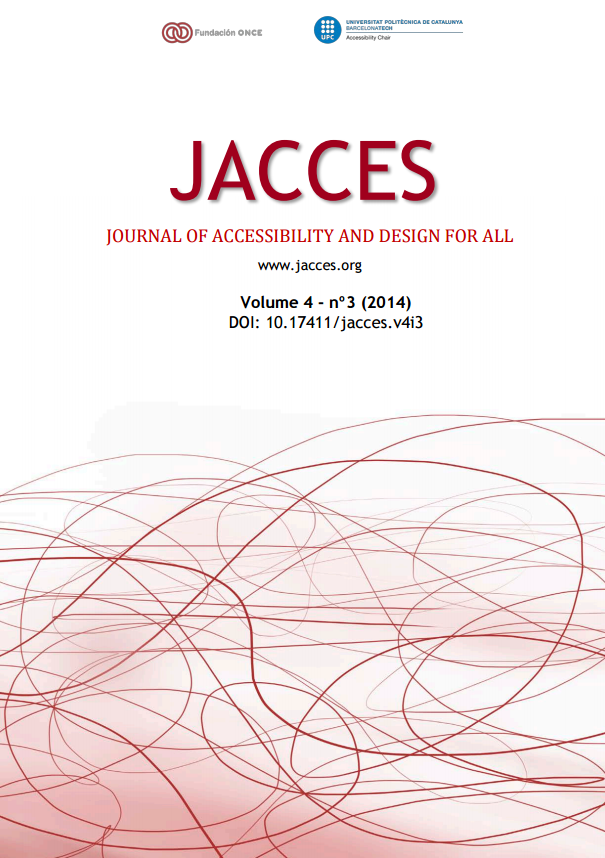An innovative solution based on human-computer interaction to support cognitive rehabilitation
Article Sidebar

Main Article Content
José M. Cogollor
Matteo Pastorino
Javier Rojo
Alessio Fioravanti
Alan Wing
Maria Teresa Arredondo
Manuel Ferre
Jose Breñosa
Joachim Hermsdörfer
Javier de Teresa
Clare Walton
Andrew Worthington
Christos Giachritsis
This contribution focuses its objective in describing the design
and implementation of an innovative system to provide cognitive
rehabilitation. People who will take advantage of this platform suffer from a
post-stroke disease called Apraxia and Action Disorganisation Syndrome
(AADS). The platform has been integrated at Universidad Politécnica de
Madrid and tries to reduce the stay in hospital or rehabilitation center by
supporting self-rehabilitation at home. So, the system acts as an intelligent
machine that guides patients while executing Activities of Daily Living (ADL),
Journal of Accessibility and Design for All
(CC) JACCES, 2014 - 4(3): 238-254. ISSN: 2013-7087
J. M. Cogollor, M. Pastorino, J. Rojo, A. Fioravanti, A. Wing, M. T. Arredondo, M. Ferre, J.
Breñosa, J. Hermsdörfer, J. De Teresa, C. Walton, A. Worthington, C. Giachritsis 239
such as preparing a simple tea, by informing them about the errors
committed and possible actions to correct them. A short introduction to
other works related to stroke, patients to work with, how the system works
and how it is implemented are provided in the document. Finally, some
relevant information from experiment made with healthy people for
technical validation is also shown.
and implementation of an innovative system to provide cognitive
rehabilitation. People who will take advantage of this platform suffer from a
post-stroke disease called Apraxia and Action Disorganisation Syndrome
(AADS). The platform has been integrated at Universidad Politécnica de
Madrid and tries to reduce the stay in hospital or rehabilitation center by
supporting self-rehabilitation at home. So, the system acts as an intelligent
machine that guides patients while executing Activities of Daily Living (ADL),
Journal of Accessibility and Design for All
(CC) JACCES, 2014 - 4(3): 238-254. ISSN: 2013-7087
J. M. Cogollor, M. Pastorino, J. Rojo, A. Fioravanti, A. Wing, M. T. Arredondo, M. Ferre, J.
Breñosa, J. Hermsdörfer, J. De Teresa, C. Walton, A. Worthington, C. Giachritsis 239
such as preparing a simple tea, by informing them about the errors
committed and possible actions to correct them. A short introduction to
other works related to stroke, patients to work with, how the system works
and how it is implemented are provided in the document. Finally, some
relevant information from experiment made with healthy people for
technical validation is also shown.
Article Details
Com citar
Cogollor, José M. et al. “An innovative solution based on human-computer interaction to support cognitive rehabilitation”. Journal of accessibility and design for all, vol.VOL 4, no. 3, https://raco.cat/index.php/JACCES/article/view/315940.
Articles més llegits del mateix autor/a
- Matteo Pastorino, Juan Bautista Montalvá Colomer, Maria Teresa Arredondo, Maria Fernanda Cabrera Umpiérrez, Design and development of augmentative and alternative digital home control interface , Journal of accessibility and design for all: 2013: Vol.: 3 Núm.: 1